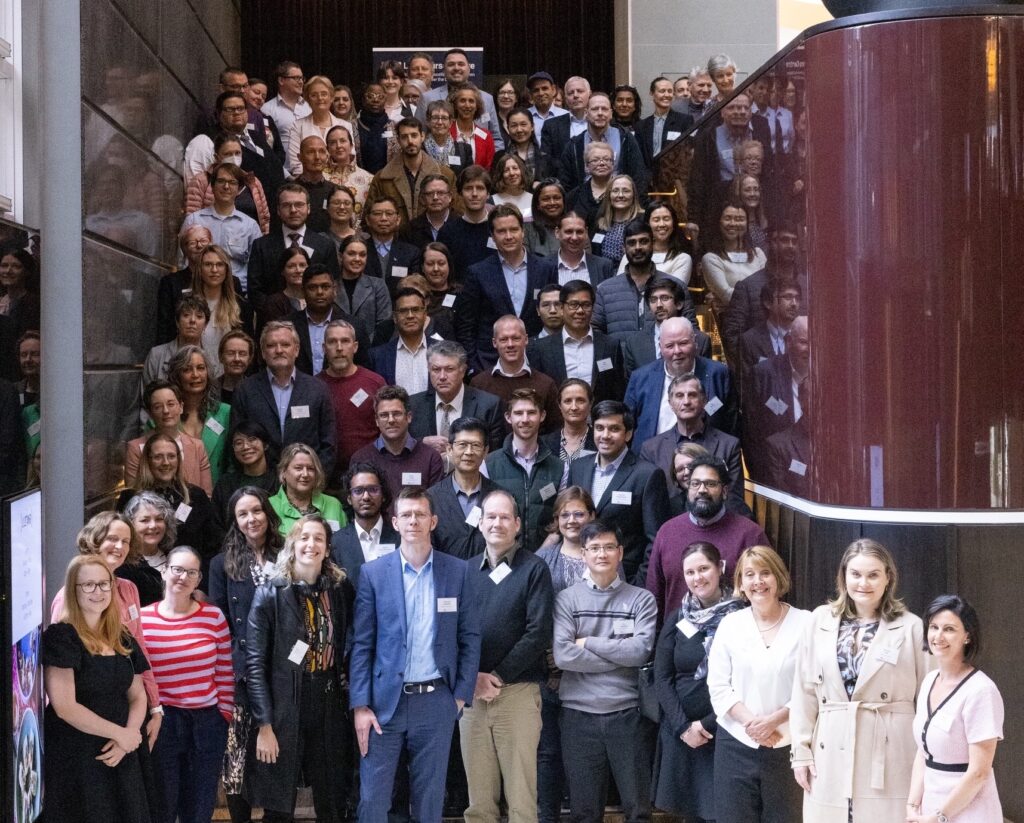The Life Course Centre has played a leading role in shaping administrative data access in Australia through our ongoing Data for Policy initiative. Our focus on leveraging administrative data for research and policy can be traced back to the start of the Life Course Centre in 2014.

The Life Course Centre has had the unique opportunity to play a key role in bringing together relevant stakeholders, undertaking proof-of-concept projects, identifying new data directions and strategies, identifying new sources of data and enhancing evidence-based policy outcomes to improve the lives of those living in social and environmental disadvantage.
In the 2023–24 Budget, the Australian Government announced a $16.4 million investment in a new ‘Life Course Data Initiative’ that will capture data insights to improve understanding of how communities experience disadvantage, including through longitudinal data. This is an exciting development that reflects the sustained Data for Policy focus of the Life Course Centre.
Strategic focus on NGO data integration
Integration of non-government organisation (NGO) service data into Australia’s linked administrative data ecosystem for research and evaluation purposes was identified as a top strategic priority following intersectoral stakeholder discussions at the 2023 and 2024 Data for Policy events.
The integration of NGO data into government linked data platforms and recommendations for the inclusion of funding for NGO data collection and evaluation in government contracts will permit vastly improved research and evaluation opportunities for NGO-delivered services and represents a vital next step for Australia’s linked data ecosystem.
Life Course Centre researchers will collaborate with NGO’s and relevant government agencies to work together to influence positive changes in the life trajectories of disadvantaged Australians via research driven policies. This engagement strategy will facilitate partnerships between the Life Course Centre, government agencies, philanthropy and NGOs to utilise administrative service data to inform policy and practise in the Australian human services context.
Why is NGO data a
key priority of Data
for Policy?
Linking NGO service data into national administrative data platforms will vastly improve the quality of research and evaluation around NGO-delivered programs and services, which, in turn will lead to tangible benefits for a range of stakeholders:

For NGOs and NGO clients Australia-wide
Improved service delivery and better outcomes

For Governments and Funders
Value for money and high-quality evidence for policymaking

For Taxpayers
Value for money and broader societal benefits

For Researchers
High-quality evidence that contributes to the academic literature and measurable research impact
Recent events
Data for Policy Summit 2023
In August 2023 the Life Course Centre brought together researchers, government departments, NGOs, not-for-profits and other stakeholders to explore new directions in innovative data access and collaborative research to inform social policy. This was our sixth Data for Policy event, dating back to the start of our Centre in 2014.

SUMMIT HIGHLIGHTS
Dr David Gruen AO
Australian Statistician
Australian Bureau of Statistics
Supporting Analysis of The Life CourseHon Dr Andrew Leigh MP
Assistant Minister for Competition, Charities and Treasury
Data and Evaluation: A Match Made in Policy HeavenTravers McLeod
Chief Executive Officer
Brotherhood of St Laurence
Destination Unknown?
Chicago Workshop 2024
In 2024, the Life Course Centre held its second International Data for Policy workshop. Stakeholders across a range of sectors who attended the 2023 Policy Summit were invited to this workshop along with international researchers who provided perspectives on the data landscape from across the world. Here, speakers identified factors that support the development of socially acceptable, next generation linked data ecosystems that deliver higher standards in research, evaluation, and policy. Comparing and contrasting Australia’s current infrastructure in linked and longitudinal life course data with other countries, allowed stakeholders to identify future strategic priorities. These were:
- Best practice guidelines for inclusion of non-government organisation (NGO) service data into government funded, research accessible, safe-sharing, linked data systems.
- Standardised user training, accreditation, and credentialing that can be recognised across multiple data systems, to prevent duplication and aid efficiency.
- Inclusion of evaluation funding into NGO service contracts, which allows for collection and safe storage of a minimum standard of service use data to support high- quality evaluation methodologies.
- Development of Community Data Labs that better utilise existing data resources to support and facilitate easy access and intuitive use of data by non-expert users.
- Publication of measures of linkage quality by both custodians of data linkage systems and researchers using linked data in papers and reports.
- Indigenous Data Sovereignty, and sovereignty of other population groups, to be considered when collecting, linking, using, and reporting from administrative data about them. These groups of interest should be included in your work from the start and lead it where appropriate.
Following the 2024 Chicago Workshop, the Data for Policy Steering Committee prioritised goals 1 and 3 as being the most urgent and achievable in the remaining period of funding for the current Life Course Centre (until December 2027). Goals 1 and 3 will be explored in detail at the October 2025 Data for Policy Workshop in Canberra, with representation from multiple NGO partners, government agencies who commission NGO programs, government data integration authorities, philanthropic organisations, and Life Course Centre researchers.
Timeline of events
2014
| Data Resource Workshop Melbourne |
2015
| Data for Policy Workshop Brisbane |
2016
| Longitudinal Data Conference Canberra |
2017
| Government Admin Data for Research Stanford University |
2019
| Data for Policy Workshop Canberra |
2023
| Data for Policy Summit Canberra |
2024
| Data for Policy Workshop Chicago |
2025
| Data for Policy Workshop Canberra |
Key projects
2015–2016
| Not in Employment, Education or Training Linked data between the Department of Social Services and Australian Bureau of Statistics to better understand NEET status of income support recipients. |
2018–2021
| Try, Test & Learn Evaluated the effectiveness of social interventions funded by the Department of Social Services. |
2019–2024
| Adult English Migrant Program Evaluation A longitudinal research study evaluating the effectiveness of the Adult Migrant English Program at improving economic outcomes for migrants, in partnership with The Department of Home Affairs. |
2023–
| Healthy Ageing over the Life Course A large cross-national collaborative project led by the World Health Organization (WHO) which brings together life course experts from approximately 30 countries to develop a framework for measuring and monitoring healthy ageing over the life course |
Current Investments
| The establishment of the Multi-Agency Data Integration Project (MADIP) at the Australian Bureau of Statistics. MADIP is a secure data asset combining information on health, education, government payments, income and taxation, employment, and population demographics (including the Census) over time. It was first established in 2015 and further developed between 2017 and 2020 through DIPA. |
| The development of state government data integration projects, such as the NSW government’s Data Analytics Unit (a Centre partner). |
| Establishment in 2018 of the Office of the National Data Commissioner within the Department of Prime Minister and Cabinet signalled a further awareness and elevation of the value of administrative data collected and held by Australian Government agencies and made available for research purposes. |
| The establishment of agency-specific data assets such as the Australian Tax Office’s ALife. |
| A number of projects looking at data assets for research purposes, including projects under the National Research Infrastructure Strategic Framework. The Australian Research Data Commons have funded projects in HASS Research Data Commons, and Supporting Indigenous Research Capability. |
| State-based linkage services continue to expand in scale and scope under the Population Health Research Network (PHRN), funded by an initial $20m cash investment from the Australian Government’s National Collaborative Research Infrastructure Strategy (NCRIS) and a $32m cash and in-kind investment from State and Territory governments from 2009-12 to establish the infrastructure, followed by repeated smaller investments since then. |
Future Considerations
| The re-funded Life Course Centre has been designed to include a much broader range of data, including geo-spatial data, biometric data, and addition of machine learning techniques to the Centre’s existing expertise in statistical analysis. As the types of data under consideration grow, and the data sets get significantly larger, modelling complex data becomes more challenging and demanding of existing infrastructures. |
| There is increasing interest in linking longitudinal and qualitative data to quantitative administrative data, for a fuller and richer picture over a longer period of time. |
| As the use of data gets more sophisticated, concerns arise in the community. A responsive and respectful approach is required towards project ethics, community consultation, ensuring a social licence for the work undertaken, and in particular the issue of Indigenous Data Sovereignty. |
| The Centre’s NGO partners and stakeholders are working towards linkage and analysis of their own data, including the possibility of linking NGO data to MADIP and/or state-based linkage infrastructures. |
| Large policy initiatives such as Closing the Gap and Safe & Supported have the need to track the success of initiatives. For these and other interventions, measuring success requires using a large range of data from a wide range of data custodians, including state and local governments, and service providers. |
| Greater use of linked data, and in particular multi-sectoral and multi-agency data, requires ensuring that the people using the data are highly trained and cognisant of all of the issues. This requires building the capacity of people in a collaborative way, and bringing together the expertise of multiple sectors. This includes building the capacity of communities to understand the way in which their administrative data is routinely used to support evidence based policy. |
The Life Course Centre has hosted several Data for Policy events:
October 2014
Data Resource Workshop
University of Melbourne
This workshop brought together senior representatives and partners from the Life Course Centre, Commonwealth and State government agencies, data custodians, data integration authorities and non-government organisations. The focus of the workshop was data integration, or data linkage, which involves combining data sets from different sources, to build more comprehensive data resources.
March 2015
Data for Policy Workshop
Brisbane
This workshop brought together key data and policy stakeholders from Commonwealth Government agencies. Life Course Centre researchers worked with government stakeholders to identify questions of immediate policy priority and research projects that could use existing data. One of the projects arising from this was the NEET project (Not in Employment, Education or Training).
October 2016
Longitudinal Data Conference
Canberra
The Department of Social Services and the Life Course Centre partnered in hosting the inaugural Longitudinal Data Conference in partnership with the Department’s National Centre for Longitudinal Data (October 2016). This was Australia’s first major public event to focus on survey and administrative longitudinal data, including the ways in which it can inform Australia’s social policy, and the key policy questions that should be driving the research agenda.
May 2017
Government Admin Data for Research Workshop
Stanford University
The Life Course Centre, Stanford Center for Poverty and Inequality, and Children’s Data Network co-hosted an international workshop on government administrative data for research purposes at Stanford University, California. Stakeholders from Australian, American and Canadian universities and government agencies were in attendance. The workshop focused on increasing awareness on the opportunities, bounds, innovations and future directions of using government administrative data to solve policy-relevant questions across countries; and identifying competencies and capacity required to enable government administrative data to be used more widely and effectively. The workshop also shared experiences on addressing social licence for using administrative data, and strategies for communication and partnerships with government agencies.
August 2019
Data for Policy Workshop
Canberra
This two-day workshop was framed around the opportunity represented by draft Commonwealth data sharing legislation being developed by the then new Office of the National Data Commissioner. As of 2022, that legislation is now in place, and data access and infrastructure issues have moved on from there. The Data Integration Partnership for Australia (DIPA 2017–20), which powered much of the Commonwealth Department-based linked data analytics was showcased at this event, but DIPA was not re-funded after 2020. However, the Centre engaged in several notable projects through DIPA, particularly through the Social, Health and Welfare Analytical Unit (SHWAU). This included in projects in early childhood education and care, higher education, and the Adult Migrant English Program.
August 2023
Data for Policy Summit
Canberra
Our sixth Data for Policy event was our biggest to date, attracting approximately 150 attendees from across all levels of government, the non-profit and community services sector, and academia. The 2023 Data for Policy Summit was held over two days in Canberra with the program shaped by our Data for Policy Planning Committee, compromising partner representatives. The summit featured a diverse range of speakers, facilitators and discussants and opportunities for networking. It included keynote government and partner addresses as well as interactive sessions spanning the future of data and its use for research, informing policy and practice, program evaluation, place-based approaches, closing the gap, early years investments, housing and homelessness, and disability.
Selected Linked Data Projects
Not in Employment, Education or Training
The Life Course Centre undertook a linked dataset analysis of Australian Department of Social Services and Australian Bureau of Statistics data to highlight the need to extend the definition of Not in Employment, Education or Training (NEET).
Try, Test & Learn
We completed an evaluation of the Try, Test and Learn (TTL) Fund for the Australian Government Department of Social Services to provide new evidence and insights into what works to reduce long-term welfare dependency.